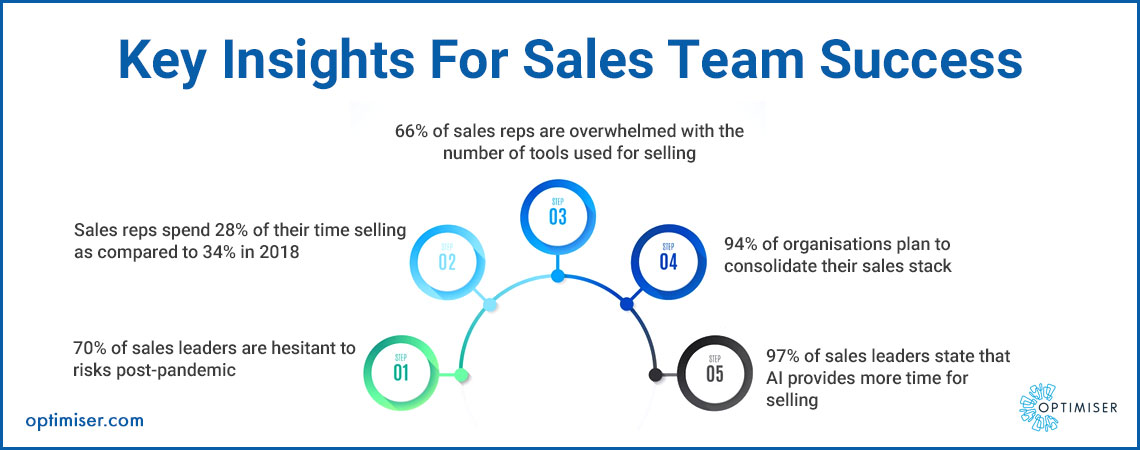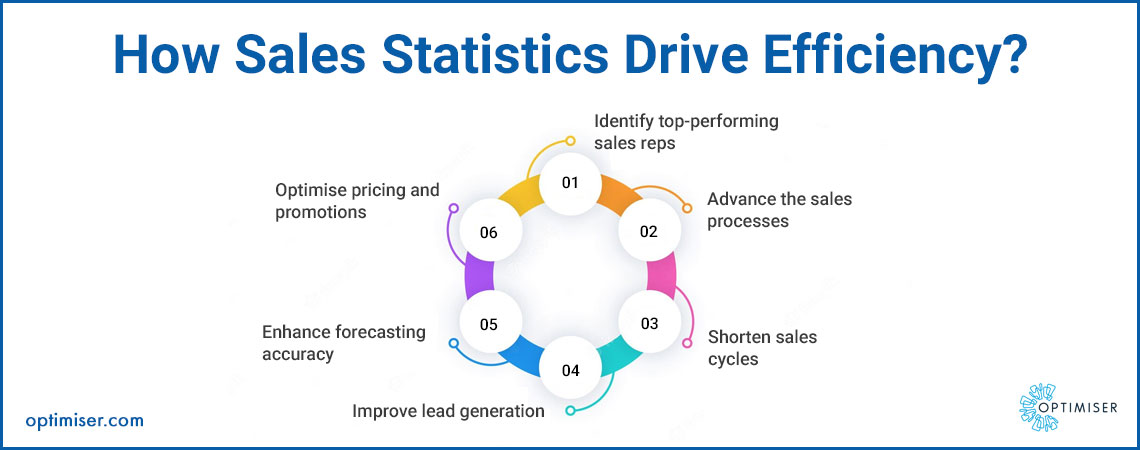
Key Insights Into The Sales Strategies For Sales Team Success
Business is a numbers game. Statistics gathered from CRM for sales and marketing shed light on different aspects of sales operations. From the impact of the pandemic on sales risk-taking and the challenges faced by sales reps to the importance of customer experience and the role of data and analytics in sales decision-making, these statistics highlight the trends and challenges facing the sales industry.
Why Do Sales Teams Need Statistics?
Sales teams use statistics for a variety of reasons, ranging from tracking performance to making data-driven decisions. Sales statistics are numbers that represent various aspects of a sales team's operations, such as the revenue generated, leads generated, and conversion rates. Here are some reasons why sales teams use statistics:
- Track performance: Sales statistics provide a way to measure and track performance over time. Sales managers can use statistics to see how well their team is performing, identify areas for improvement, and set performance targets.
- Make data-driven decisions: Statistics provide a quantitative basis for decision-making. Sales teams can use statistics to evaluate the effectiveness of different strategies, such as marketing campaigns or sales tactics, and adjust their approach based on the data.

- Identify trends: Sales statistics can reveal patterns and trends in customer behaviour and preferences. By analysing this data, sales teams can better understand their customers and adapt their sales approach accordingly.
- Forecast sales: Sales statistics can be used to predict future sales based on historical trends and patterns. This information can be used to set sales targets, allocate resources, and plan for the future.
- Benchmark against competitors: Sales statistics taken from CRM for sales team can be used to compare a team's performance against that of its competitors. This information can provide valuable insights into how well the team is doing and identify areas for improvement.
- Motivate and incentivise: Sales statistics can be used to motivate and incentivise sales reps. For example, sales contests can be based on specific performance metrics, such as the number of leads generated or the amount of revenue generated.
Key Insights Into The Sales Strategies For Sales Team Success
According to research done by Salesforce, the following statistics are necessary for sale team success:
- The majority (70%) of sales leaders believe their company is taking fewer risks now than it did before the pandemic. This is not surprising given the economic uncertainty caused by the pandemic. However, the cautious approach may hinder growth and innovation.
- Sales representatives now spend only 28% of their time selling, which is down from 34% in 2018. Sales reps want to sell, but they are bogged down with too much manual work.
- Two-thirds (66%) of sales reps feel overwhelmed by the number of tools they have to use. Drowning in tools can lead to frustration and burnout. Almost all (94%) of sales organisations are planning to consolidate their technology stack within the next 12 months.
- Nearly all (97%) sales leaders and sales operations professionals agree that AI technology allows sales reps to have more time for selling. AI can be used to automate repetitive tasks, such as data entry and lead management, freeing up time for reps to focus on selling.
- A large majority (90%) of sales reps on high-performing teams report that their leadership encourages them to prioritise building long-term customer relationships over short-term wins.
- Four out of five (81%) sales representatives say that team selling is beneficial for closing deals. Sales leaders encourage collaboration and teamwork within their sales teams to improve their chances of closing deals.

Also Read: Save Costs And Increase Business Accuracy With Intelligent Automation
- A considerable proportion (85%) of sales leaders report facing challenges when trying to secure a budget for hiring new staff.
- Most (81%) sales reps feel that they receive valuable coaching from their manager.
- Only 28% of sales professionals expect to meet or exceed their quota in the upcoming year, but sales organisations are providing support to help them achieve their targets. Sales leaders must provide the necessary support and resources to help their sales teams achieve their quotas and drive growth.
Optimiser's Sales Suite For Sales Leaders
Best CRM for enterprise sales, Optimiser CRM offers a comprehensive CRM solution designed to help sales leaders drive accelerated growth in their organisations. With Optimiser CRM, sales leaders can easily manage their sales pipeline, track leads and opportunities, and gain valuable insights into their sales performance. The platform offers a range of features, including lead and opportunity management, email and SMS marketing, task and calendar management, reporting and analytics, and more. One key advantage of Optimiser CRM is its ease of use and flexibility, making it an ideal solution for sales leaders looking to quickly onboard their sales teams and get them up and running. The platform is also highly customisable, allowing sales leaders to tailor it to their specific business needs and processes.
Summary
Leveraging statistics is a critical component of driving accelerated growth for sales teams. By identifying the right metrics, analysing trends, segmenting customers, using predictive analytics, A/B testing, benchmarking against competitors, continually monitoring performance, and utilising technology, sales teams can make data-driven decisions that result in increased revenue and customer satisfaction.

30 days free trial. No credit card required
 One powerful platform
One powerful platform
 Simple to use
Simple to use
 Comprehensive
Comprehensive



